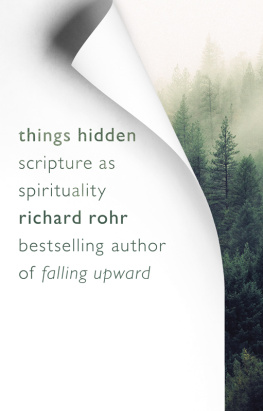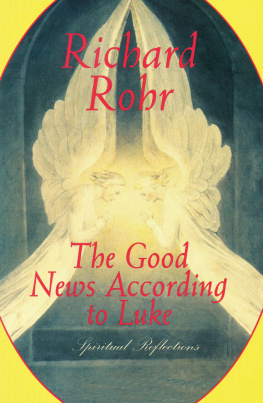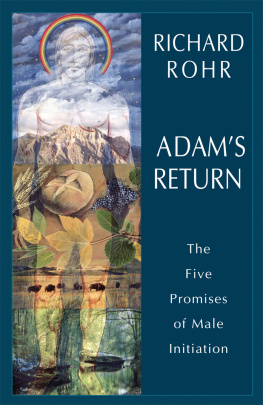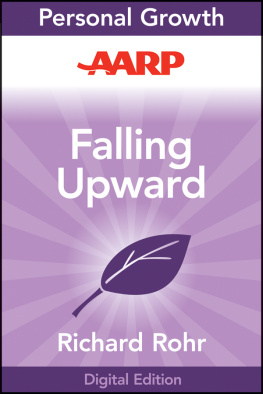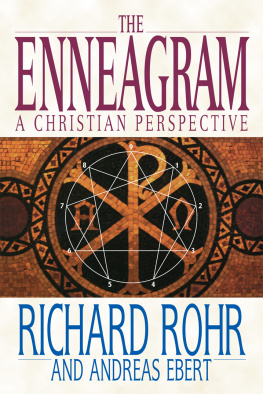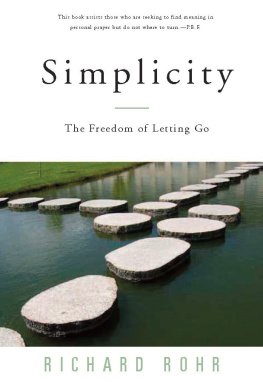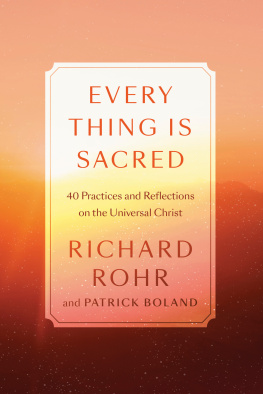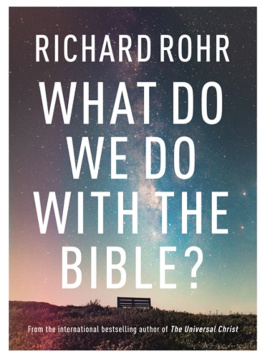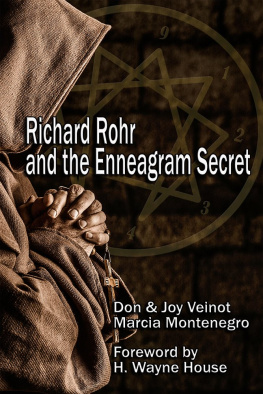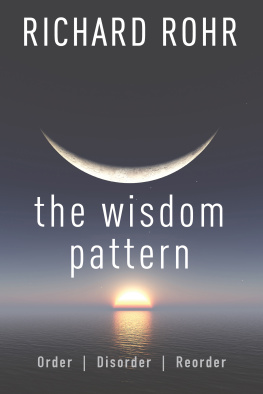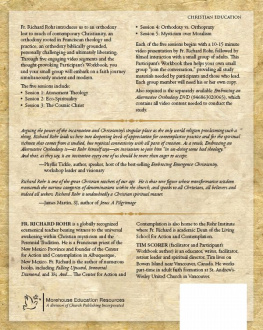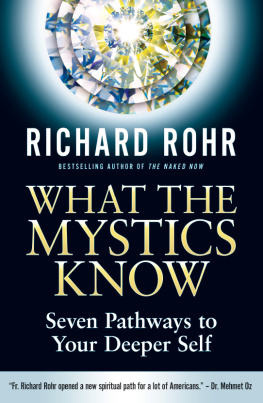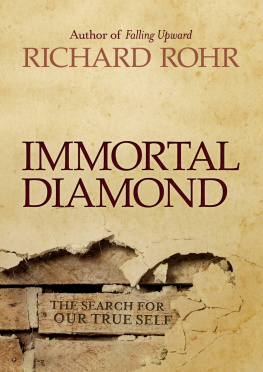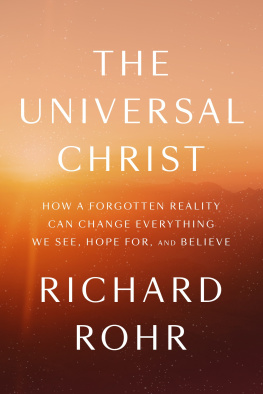All rights reserved. No part of this book may be reproduced or transmitted in any form or by any means, electronic or mechanical, including photocopying, recording, or by any information storage and retrieval system, without permission in writing from the publisher.
SPCK does not necessarily endorse the individual views contained in its publications.
Unless otherwise noted, Scripture passages are the authors own translation. All rights reserved.
We teach not the way that philosophy is taught, but in the way that the Spirit teaches. We desire to teach spiritual things spiritually.
1 Corinthians 2:13
In your goodness, you let the blind speak of your light.
Nicholas of Cusa
I am writing this book based on a set of talks I gave in 1998, the twenty-fifth anniversary of my first taped talks, The Great Themes of Scripture, given in 1973 at Mount St. Joseph College, in Cincinnati, Ohio. The editors at St. Anthony Messenger Press asked me to reflect again on what I thought were the great themes twenty-five years later. This book is my attempt.
I dare to write not because I strongly trust in my own ability to write, but with a much stronger faith in the objective presence of the Stable Witness within who will teach you everything (John 14:26) and whose law is already written on your hearts (Jeremiah 31:33). All that a spiritual teacher really does is second the motions of the Holy Spirit.
The first motion is already planted within us by God at our creation (Jeremiah 1:5; Isaiah 49:1), and that is probably what gives spiritual wisdom both such inner conviction and such outer authority. I have always said that the best compliment I ever get is when people tell me something to this effect: Richard, you did not teach me anything totally new. Somehow I already knew it, but it did not become conscious or real for me until you said it.
That is the divine symbiosis between mutual members of the body of Christ, or the midwifery of Socrates, who believed that he was merely delivering the baby that was already inside the person. On some level, spiritual cognition is invariably experienced as re-cognition. Even Peter said that his work was largely recalling and reminding (see 2 Peter 1:1215) his people. For some reason, we have forgotten that. It makes us preachers and teachers take ourselves far too seriously, and it makes believers far too reliant upon external authority.
I am also convinced by what Malcolm Gladwell, in his 2006 best-seller, Blink , calls the phenomenon of thin slicing in our human search for patterns and wisdom. He believes that what we call insight or even genius comes from the ability of some people to sift through the situation in front of them, throwing out all that is irrelevant, while zeroing in on what really matters. The truth is that our unconscious is really good at this, to the point where thin-slicing often delivers a better answer than more deliberate and exhaustive ways of thinking.
I would hope that I am doing some sort of thin-slicing here, and that it will open you to real spiritual transformation and what really matters. Frankly, my disappointment in so much scriptural preaching and teaching is that it never seems to get to this level of patterning, but often just remains on the level of anecdote, historical and critical analysis. Its often inspiration and even good theology, but it seldom seems to connect the dots and see the developing tangents. Connecting those dots is absolutely necessary, or we will have no markers by which to recognize the regressive passages that back away from those same tangents. We must see where the dots are leading us.
Our unwillingness, or our inability, to thin-slice the texts and then discern the tangents has created widespread fundamentalist Christianity, Judaism and Islam, which, ironically, usually miss the fundamentals! If you do not know the direction and the momentum, you will not recognize the backpedaling. You will end up making very accidental themes into fundamentals while missing the biggies! One dot is not wisdom: You can prove anything you want from a single Scripture quote.
My assumption throughout this book is that the biblical text also mirrors the nature of human consciousness itself. It includes within itself passages that develop the prime ideas and passages that fight and resist those very advances. You might even call it faith and unfaithboth are locked into the text.
The journey into the mystery of God is necessarily a journey into the unfamiliar. While much of the Bible is merely a repetition of familiar terrain, where nothing new is asked of history or nothing new given to the soul, there are also those frequent breakthroughs, which we would rightly call revelations from the Spirit (because you would never come to them by your own small mind).
But once you observe the trajectory, you are always ready to be surprised and graced by the Unfamiliar, which is why it is called faith, to begin with. That is what we will attempt to do here. It might first feel scary, new or even exciting, but if you stay with the unfolding texts, you will have the courage to know them also as your own deepest hopes or intuitions. Such is the dance between outer authority and inner authority, the Great Tradition and inner experience. This is the balance we will seek here.
Unlike many who might go book by book through the Bible, Im going to try to show how the prime ideas of Scripture are already indicated in (1) capsulated form at the beginning in the Hebrew Scriptures. From that early statement of the theme, we will proceed with something akin to a (2) character or theme development through the whole middle part of the Bible. By the end, especially in the Risen Christ and in Pauls theology of the Risen Christ, we have sort of the (3) crescendo, the full revelation of One we can trust to be a nonviolent and thoroughly gracious God, who is inviting us into loving union.
It takes all of the Bible to get beyond the punitiveness and pettiness that we project onto God and that we harbor within ourselves. But for now we have to keep connecting the dots. Remember, how you get there determines where you will finally arrive . The process itself is important and gives authority to the outcome. The medium does become the message, as Marshall McLuhan famously said in the 1960s. The two-steps-backward texts give us even deeper urgency to go forward and much deeper understanding when we get there.
My desire here is to make some clear connections with what I perceive to be the prime ideas in the Judeo-Christian Scriptures with a practical and pastoral spirituality for believers today. Although my tangent definitely coalesces in Jesus, whom we Christians call the Christ, I would like to believe that a lover of the Hebrew Scriptures will also find much to relish here.
I love the clear continuities between the two Testaments and clearly see Jesus as first of all a Jew, who brilliantly thin-sliced his own tradition and gave us a wonderful lens by which to love the Jewish tradition and keep moving forward with it in an inclusive way (which became its child, Christianity).

